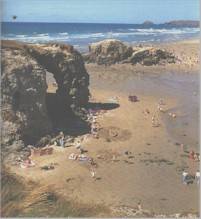|
There were few settlements in Cornwall in the early Stone Age. It is
assumed that a drift across the land bridge from Europe brought
settlers to the area. There are remains of a stone age settlement at
Carn Brea near Redruth. The name Cornwall comes from Cornovii, meaning
hill dwellers and Waelas meaning strangers.
Around 2500 BC, the locals began trading in copper and tin with the
traders from small colonies along the French shore. These traders
brought Bronze tools and gold ornaments in exchange for the minerals.
Around 1000 BC, the Celts migrated from Europe and settled in Cornwall.
They brought knowledge of advanced forging techniques. Our family lived
near a well preserved settlement in Penzance in Chysauster. Here, the
grinding stones and fireplaces still remain. These settlements were
usually on promontories for defensive purposes and were call "kers",
meaning fort and Dinas, meaning hill.
The
Romans landed in Britain in 55 BC. They did not bother with the Cornish
regions, as Cornwall has few safe ports. When the Romans left Britain,
Cornwall came under Saxon influence. After the Norman Conquest in 1066,
William's half-brother Robert was given all of Cornwall to govern. Then
Cornwall was rule for many years by a sucession of Norman and
Plantagenet kings. Through the 15th, 16th and 17th century, numerous
rebellions took place as well as the Spanish invasion and The Civil War
of 1642-1649.
As the industrial revolution brought the use of steam engine and mining
advances to Cornwall in the 18th and 19th centuries, mines were sunk
deeper and deeper. However, by the middle of the 19th century, vast
deposits of tin and copper ore were found abroad. The deep Cornish
mines were too expensive to compete. Thus, many of our relatives
migrated to those new mines in the Americas, Australia and South
Africa.. Many of our relatives, as detailed on the genealogy pages, can
still be found on these continents.
With the mines no longer in operation and fish stocks dwindling, Cornwall's major industry today is tourism. It has miles
of sandy beaches, coastal walks and a mild climate.
Cornwall's
flag is the flag of St Piran, patron saint of miners, and is said to
represent the triumph of good over evil. Cornwall also has its own
anthem, "Song of the Western Men". And its own national emblem, a
shield of 15 golden balls, representing the ransom raised in Cornwall
for the Duke of Cornwall, captured by the Saracens during the Crusades.


|

